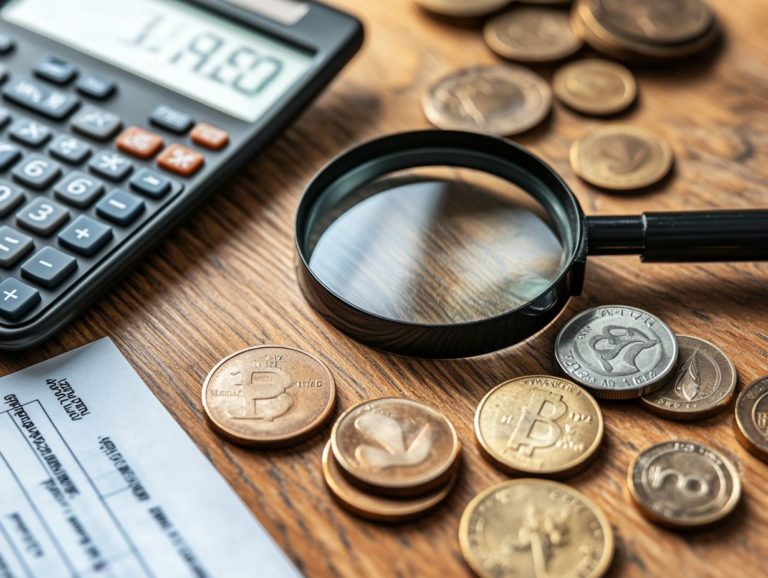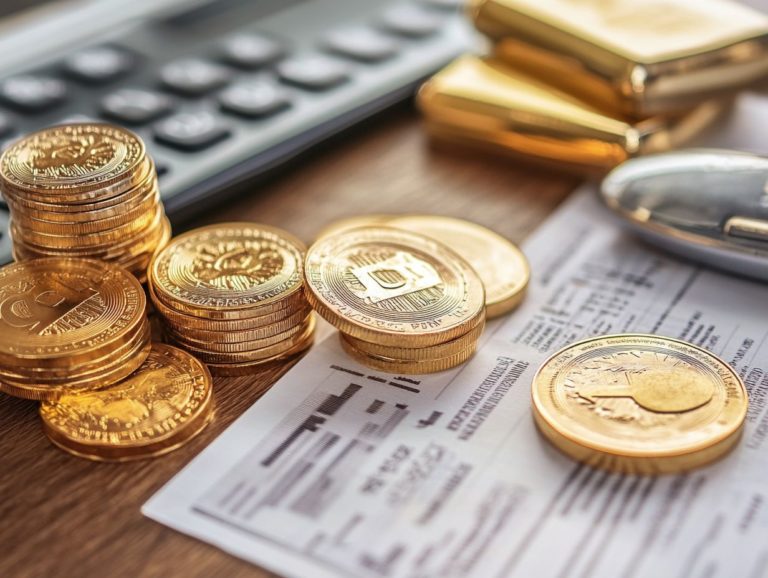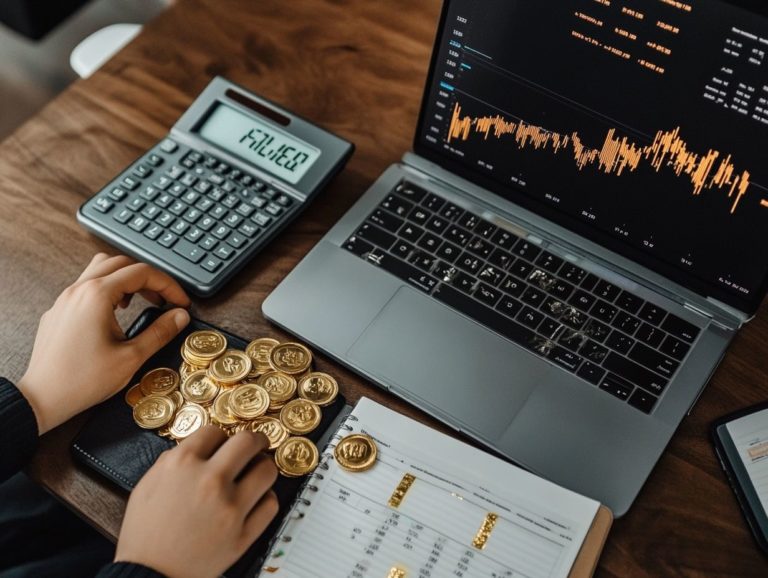How to Stay Updated on Tax Changes Affecting Precious Metals
Navigating the world of precious metals can be intricate, especially regarding tax implications.
With ever-changing market conditions and evolving government policies, staying informed about taxation on gold, silver, and other precious assets is essential for you as an investor.
This article explores the factors influencing tax laws, offers strategies to maximize benefits while minimizing liabilities, and provides tips on staying updated with ongoing tax changes.
Whether you’re a seasoned investor or just starting your journey, understanding these nuances will empower you to make informed decisions in your precious metals adventure.
Contents
- Key Takeaways:
- Understanding Precious Metals and Taxes
- Factors That Can Impact Tax Laws on Precious Metals
- Ways to Stay Informed About Tax Changes
- Strategies for Adapting to Tax Changes
- Frequently Asked Questions
- What are reliable sources for tax updates on precious metals?
- How often do tax changes affecting precious metals occur?
- Can tax changes affect the value of precious metals?
- Are there specific tax laws that apply to purchasing and selling precious metals?
- How can I stay updated on international tax changes affecting precious metals?
- What are some potential consequences of not staying updated on tax changes affecting precious metals?
Key Takeaways:

- Stay updated on tax changes affecting precious metals by following industry news.
- Consult tax professionals to understand the impact of government policies and market conditions on tax laws for precious metals.
- Maximize tax benefits and minimize liabilities by adapting strategies in response to tax changes.
Understanding Precious Metals and Taxes
Understanding the relationship between precious metals and taxes is vital for you as an investor seeking to enhance your portfolio. Precious metals like gold, silver, platinum, and palladium are tangible assets that carry specific tax implications that can significantly impact your financial outcomes.
It’s essential to grasp the various tax laws and regulations that apply, including capital gains tax and tax obligations. This knowledge helps optimize your investment strategies while ensuring compliance with IRS reporting requirements.
Overview of Taxation on Precious Metals
Understanding taxation on precious metals requires you to know the different tax rules, including capital gains tax and specific IRS reporting requirements.
As you explore precious metals like gold, silver, platinum, and palladium, recognize that these assets are classified as collectibles. This classification can significantly affect the tax rates you’ll encounter upon their sale.
If you hold the metals for less than a year, any short-term gains may be taxed at your ordinary income rates. However, if you hold them for over a year, you ll typically face a maximum tax rate of 28% on long-term gains.
IRS forms like the 1099-B are crucial for accurately reporting these transactions, underscoring the importance of meticulous record-keeping. By maintaining diligence in your documentation, you can manage your tax obligations effectively and potentially recover some losses if market conditions turn unfavorable.
Factors That Can Impact Tax Laws on Precious Metals
Several factors can influence tax laws pertaining to precious metals. Changes in government policies, fluctuations in market conditions, and evolving tax implications are elements you must stay informed about as an investor.
Keeping an eye on these dynamics will help you navigate the complexities of the precious metals market.
Changes in Government Policies

Changes in government policies can significantly influence the tax laws surrounding precious metals.
For instance, recent adjustments to capital gains tax rates could reshape the investment landscape for those considering gold or silver assets. These shifts might deter some investors from entering the market due to increased tax liabilities upon selling these commodities.
New regulations regarding reporting requirements for precious metal purchases may introduce complexities that you might not feel equipped to navigate alone. Consulting with a tax professional becomes essential to ensure compliance with the latest requirements and optimize your tax strategies.
Stay informed and proactive about changes that could affect your investments in precious metals!
Market Conditions and Trends
Market conditions and trends greatly influence the tax implications of your investments in precious metals. They can also shape your overall investment strategies.
When the prices of precious metals like gold and silver rise sharply, you might realize significant profits, leading to higher tax bills. Recently, gold prices surged by over 25%, prompting many investors to reconsider their portfolios.
Falling prices can limit gains but offer tax-loss harvesting opportunities, which means selling investments at a loss to offset taxes on gains. You need to consider not only the immediate financial impact but also how these fluctuations affect your long-term strategies.
As market dynamics evolve, adapting your investment approach becomes essential. This helps you optimize returns while skillfully navigating the complexities of capital gains tax.
Ways to Stay Informed About Tax Changes
Staying informed about tax changes is essential for everyone investing in precious metals. Regularly consult with tax professionals and keep a close eye on industry news and updates.
Your financial well-being depends on it.
Following Industry News and Updates
Staying on top of industry news is vital for you as an investor aiming to anticipate tax changes related to precious metals.
Being well-versed in market trends is essential. Countless resources are available to meet this need. Reputable financial news outlets deliver timely insights, while specialized newsletters can help you stay informed about precious metals tax changes and provide in-depth explorations of the precious metals sector.
Dedicated websites feature articles, analyses, and forums where enthusiasts discuss the latest legislative developments that could impact your tax obligations. These resources keep you informed and equip you with the knowledge needed to navigate potential changes seamlessly.
Ensure you’re always ready to make sound investment decisions in an ever-evolving marketplace.
Consulting with Tax Professionals

Consulting with tax professionals is invaluable for you as an investor in precious metals. They provide essential support in effective tax planning and ensure you meet all tax obligations.
By leveraging their expertise, you can receive tailored guidance that perfectly aligns with your unique financial situation. These professionals navigate the complexities of current tax laws, offering insights into compliance requirements that can shield you from potential penalties.
They provide strategic advice on capital gains tax, helping you understand how to optimize your investments while minimizing tax liabilities.
Maintaining accurate records is crucial. These professionals highlight the importance of organized documentation, leading to greater clarity and more well-considered choices regarding your specific tax responsibilities.
Strategies for Adapting to Tax Changes
Adapting to tax changes is essential for you as an investor in precious metals. You must create effective investment strategies that maximize your tax benefits while minimizing tax liabilities.
By staying informed and proactive, you can navigate the complexities of the tax landscape and optimize your investment outcomes.
Maximizing Tax Benefits
To maximize the tax benefits of your precious metals investments, consider leveraging tax-advantaged accounts and crafting informed investment strategies.
Utilizing Individual Retirement Accounts (IRAs) or 401(k) plans can be exceptionally effective. These accounts often come with significant tax advantages, allowing your assets to grow at a faster pace.
Employing a strategic asset allocation strategy will help optimize your tax outcomes. Timing your purchases and sales is equally crucial. Selling in years when your taxable income is lower could significantly reduce your overall tax liability.
This level of comprehensive planning is essential for any serious investor looking to maximize their returns.
Minimizing Tax Liabilities
Minimizing tax liabilities is crucial for investors in precious metals. Simple strategies like tax-loss harvesting can help you achieve this goal.
By strategically selling assets and understanding different capital gains tax rates, you can manage your taxes effectively. Knowing the difference between short-term and long-term capital gains can directly influence when you sell your precious metals for the best tax outcome.
You must keep accurate records of your transactions. This not only ensures accuracy but also protects you in case of an audit.
Stay updated on tax regulations to make the most of available strategies and enhance your investment journey.
Frequently Asked Questions

What are reliable sources for tax updates on precious metals?
Some reliable sources include government websites, financial news outlets, and tax advisory firms.
How often do tax changes affecting precious metals occur?
Tax changes can happen every year or even more often based on government decisions.
Can tax changes affect the value of precious metals?
Yes, taxes can influence the value of precious metals by affecting market demand.
Are there specific tax laws that apply to purchasing and selling precious metals?
Yes, laws like capital gains tax apply when buying or selling precious metals. Always consult a tax advisor for guidance.
How can I stay updated on international tax changes affecting precious metals?
Follow international financial news and watch for changes in major economies.
What are some potential consequences of not staying updated on tax changes affecting precious metals?
Ignoring tax changes can lead to unexpected tax bills, missed deductions, or legal issues.















